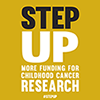In Treatment
The goal of treatment for Hodgkin disease, as with most cancers, is the cure of the disease with minimal short- and long-term side effects. Most Hodgkin disease in children and adolescents cannot be cured with surgery alone to remove the tumor. There is a less common subtype (lymphocyte predominant histology) that may be managed with surgery alone if classified as stage I and if doctors are able to completely remove the tumor surgically.
The majority of children with Hodgkin disease are treated with chemotherapy and many receive “combined modality” therapy that includes radiation. Carefully selected children are treated with only chemotherapy. Stem cell transplant may be used for treatment if Hodgkin disease has come back after successful treatment (relapse) or if the cancer does not respond to conventional treatments (refractory). Your healthcare team will discuss the options that are best for your situation.
Initial therapy depends on the stage and bulk (size) of disease as well as with the subtype of Hodgkin Lymphoma. Patients with lower stage (or early stage) disease, such as IA and IIA, receive less chemotherapy than higher stage patients. The amount of therapy can also be affected by whether a patient is designated a rapid early responder (RER), meaning the cancer responds quickly to initial treatment or a slow early responder (SER), meaning the cancer responds more slowly to initial treatment. Currently, RER patients receive less total treatment than patients with the same disease stage designated as SER. While most patients are treated with both chemotherapy and radiation therapy, efforts are underway to identify RER patients who can be treated without radiation therapy while still maintaining equally high survival rates.
Research Studies
The majority of children with cancer participate in research studies. This high rate of participation has been essential to improving the cure rates for children’s cancer.
Researchers design various studies to improve treatment and advance the understanding of cancer and its causes. Clinical trials are carefully reviewed and must be approved through a formal scientific process before anyone can be enrolled. If there is a research study “open” that your child is “eligible for,” you may be asked to allow your child to participate. It is also possible that your child will be asked to participate in more than one study.
Whether an individual is eligible for a particular study may depend on age, location of the cancer, the extent of the disease and other information. Researchers usually must limit their study to some of these characteristics to have a scientifically valid study. Further, researchers must follow exactly the same restrictions throughout the study.
If your child is eligible to participate in one or more study, your doctor will discuss these with you during an initial treatment conference (also called informed consent conference). The doctor will describe the study, potential risks of participation, and other information you need to decide whether or not you would like your child to participate in the study. You always have the choice to participate or not in research studies.
If you do choose to have your child participate in a study, you doctor will explain what type of information you will receive about the results of the study. The overall results of the research study will be published to inform the public and other researchers. No study will publish any information that identifies an individual.
Visit the Clinical Trials section of this website to learn more about the various kinds of research studies.
Last updated July, 2011
About Hodgkin Disease
Just Diagnosed with Hodgkin Disease
After Treatment for Hodgkin Disease








